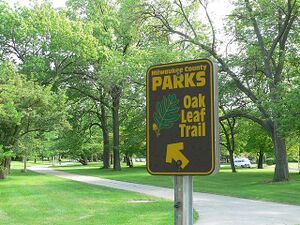
- Community-Led Commercial Hub Is Transforming Milwaukee's Poorest Neighborhood, Nov 9, 2016...[1]
Networks and sustainability initiatives[edit | edit source]
Community resources[edit | edit source]
- Madison Area Community Land Trust, (MACLT), non-profit based in Madison, that sells high-quality, energy-efficient homes at below market prices to low-moderate income households
- Social Justice Center, Madison
Climate change[edit | edit source]
According to the United States Environmental Protection Agency, "Wisconsin's climate is changing. In the past century, most of the state has warmed about two degrees (F). Heavy rainstorms are becoming more frequent, and ice cover on the Great Lakes is forming later or melting sooner. In the coming decades, the state will have more extremely hot days, which may harm public health in urban areas and corn harvests in rural areas". W
Community energy[edit | edit source]
Focus on Energy, statewide program for energy efficiency and renewable energy - Wikipedia: Solar power in Wisconsin
Cycling activism[edit | edit source]
Wikipedia:
- Oak Leaf Trail: The Oak Leaf Trail (formerly 76 Bike Trail) is a paved 108-mile (174 km) multi-use recreational trail which encircles Milwaukee County, Wisconsin. Clearly marked trail segments connect all of the major parks in the Milwaukee County Park System with a "ribbon of green."
Education for sustainability[edit | edit source]
Wikipedia:
- Urban Ecology Center, nonprofit organization in Milwaukee, Wisconsin. Their mission is to educate the Milwaukee community about the environment, conservation, sustainability, and other issues related to urban ecology, as well as to preserve and protect the natural areas in the city. The organization is headquartered in the Riverside Park neighborhood. There are two other branches: the Washington Park branch which opened in 2007 and the Menomonee Valley branch which opened in 2012.
Sustainable transport activism[edit | edit source]
Wikipedia: List of hiking trails in Wisconsin
Towards sustainable economies[edit | edit source]
Madison
Allied Community Co-op is the first Mutual Aid Network pilot site. It's where some of the organization's fundamental ideas were born. Located in a food desert with little infrastructure (no school, grocery store, library, or neighborhood center), the Allied Co-op is working to bring a food buying club and a cooperatively-owned grocery store to the neighborhood.
The Social Justice Center, a multi-stakeholder nonprofit building in Madison's affluent East Side, is a convening partner in exploring Madison's second Mutual Aid Network pilot, which will be an inter-city partnership connecting Allied Co-op and many other local stakeholders in a network of resource-sharing and exchange initiative designed to create more equitable distribution of existing resources across the city.[2]
Urban sustainability[edit | edit source]
Walnut Way Conservation Corp, 501(c)(3) nonprofit neighborhood organization, Milwaukee
Citizens data initiative[edit | edit source]
The cities of Wisconsin have been active in increasing the availability of legislative information on the internet, thereby providing for greater government transparency. Currently three of the five most populous cities in Wisconsin provide their constituents with internet-based access of all public records directly from the cities' databases. Wisconsin cities started to make this a priority after Milwaukee began doing so, on their page, in 2001. One such city, Madison, has been named the Number 1 digital city by the Center for Digital Government in consecutive years.[3]
Energy Profile for Wisconsin, Economic, environmental, and energy data
News and comment[edit | edit source]
2016
Growing Power grows fish, veggies, and community with aquaponic farm, January 6[4]
See also[edit | edit source]
About Wisconsin[edit | edit source]
Wisconsin ( wisk-ON-sin) is a state in the Great Lakes region of the Upper Midwest of the United States. It borders Minnesota to the west, Iowa to the southwest, Illinois to the south, Lake Michigan to the east, Michigan to the northeast, and Lake Superior to the north. Wisconsin is the 20th-largest state by population and 23rd-largest state by area. It is divided into 72 counties and as of the 2020 census had a population of nearly 5.9 million. Its most populous city is Milwaukee, while its capital and second-most populous city is Madison. Other urban areas include Green Bay, Kenosha, Racine, Eau Claire, and the Fox Cities.
Wisconsin's geography is diverse, shaped by Ice Age glaciers except for the Driftless Area. The Northern Highland and Western Upland along with a part of the Central Plain occupy the western part of the state, with lowlands stretching to the shore of Lake Michigan. Wisconsin is third to Ontario and Michigan in the length of its Great Lakes coastline. The northern portion of the state is home to the Chequamegon-Nicolet National Forest. At the time of European contact, the area was inhabited by Algonquian and Siouan nations, and today it is home to eleven federally recognized tribes. Originally part of the Northwest Territory, it was admitted as a state in 1848. During the 19th and early 20th centuries, many European settlers entered the state, most of whom emigrated from Germany and Scandinavia. Wisconsin remains a center of German American and Scandinavian American culture, particularly in respect to its cuisine, with foods such as bratwurst and kringle.
Wisconsin is one of the nation's leading dairy producers and is known as "America's Dairyland"; it is particularly famous for its cheese. The state is also famous for its beer, particularly and historically in Milwaukee, most notably as the headquarters of the Miller Brewing Company. Wisconsin has some of the most permissive alcohol laws in the country and is known for its drinking culture. Its economy is dominated by manufacturing, healthcare, information technology, and agriculture—specifically dairy, cranberries, and ginseng. Tourism is also a major contributor to the state's economy. The gross domestic product in 2020 was $348 billion. Wisconsin is home to one UNESCO World Heritage Site, comprising two of the most significant buildings designed by Wisconsin-born architect Frank Lloyd Wright: his studio at Taliesin near Spring Green and his Jacobs I House in Madison. The Republican Party was founded in Wisconsin in 1854; in modern elections, it is considered a swing state.
References